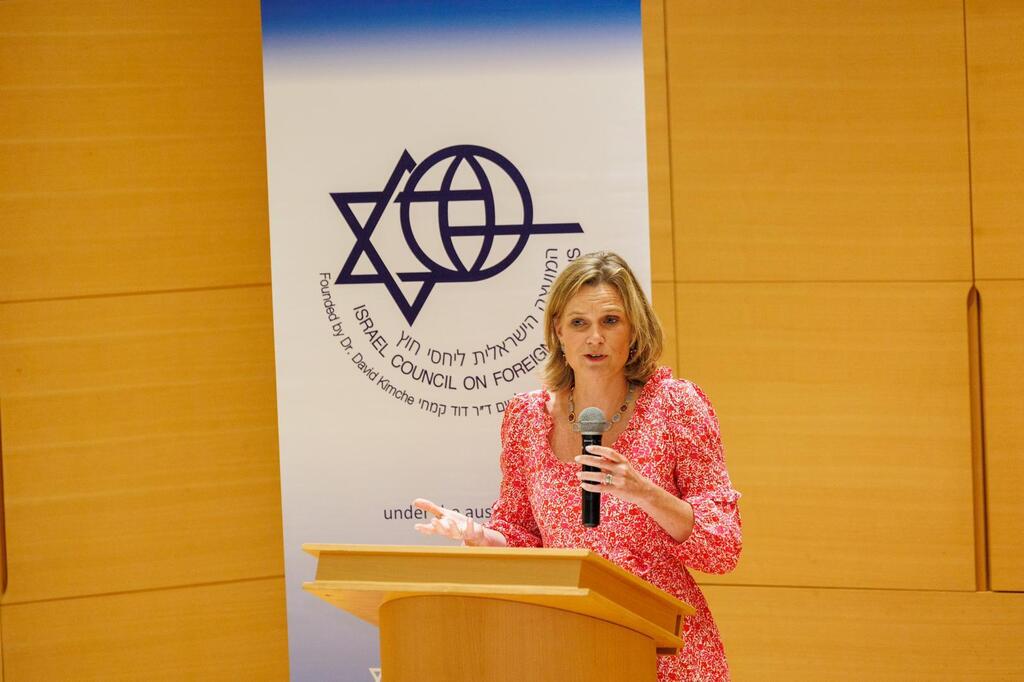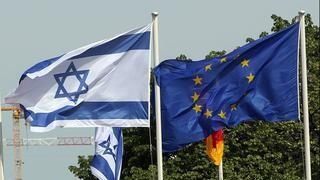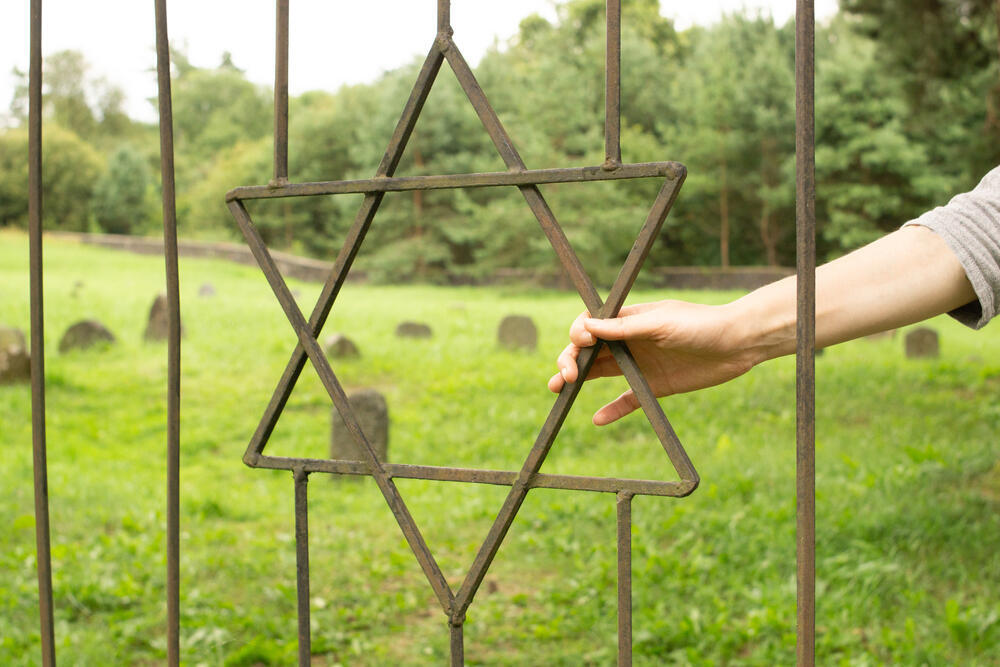Getting your Trinity Audio player ready...
EU Envoy Katharina von Schnurbein speaks out on the IHRA definition of antisemitism
(Video: Emily Schrader)
European antisemitism is nothing new – but many of its modern manifestations are. From Holocaust denial and distortion to the rise of the far right to online antisemitism, bigotry against Jews is on the rise in new and unfortunately creative ways.
More stories:
Katharina von Schnurbein, the EU’s envoy for combating antisemitism, announced a new approach being rolled out by the EU during her recent visit to Israel where she addressed the Israel Council on Foreign Relations (ICFR), a project of the World Jewish Congress (WJC), and spoke about the importance of the International Holocaust Remembrance Alliance (IHRA) definition of antisemitism, among other new collaborative initiatives from the EU.
5 View gallery


EU Envoy for Combating Antisemitism Katharina Von Schnurbein
(Photo: Noam Feiner/ICFR)
A reactive and proactive approach
The new strategy from the EU includes not only a reactive approach, along with a considerable budget, to fight antisemitism but also a proactive approach to bolster Jewish life within Europe today.
“The strategy has about 100 different actions in it. Some of them we implement on our own…many others we implement together with member states, together with Jewish communities, with civil society actors, with cities, with international partners,” says von Schnurbein.
For example, von Schnurbein describes how the EU and her office responded to the recent controversy over kosher slaughter in Belgium as well as the discussions of banning kosher slaughter in Finland, bringing together the communities impacted and investigating the impact of such legislation.
“It's really about the stigmatization and being put into a corner, being seen as cruel towards animals. This was one of the very concrete initiatives that we had in the strategy and implemented immediately together with international partners,” she says.
Beyond dealing with practical issues on the ground in Europe, the strategy also focuses on a number of initiatives geared towards social media and the online world, including developing educational tools, promoting Holocaust remembrance and education in creative ways to teach future generations, as well as collecting data on incidents of antisemitism.
Recently, the EU held a two-day conference with Jewish organizations from across Europe, where they can mutually support each other and even team up to request EU funding for the campaigns and efforts of the organizations that align with the agenda of the EU.
“We really want to support those organizations, mainly Jewish, not only Jewish, that address these issues and have been addressing them for many years against all odds, and to support them in this…”
One of the EU’s current initiatives is a one-year program in partnership with the Mémorial de la Shoah in Paris to develop training for Holocaust education for European youth ambassadors in six countries.
“In the end, they come together in Paris and… initiate Holocaust remembrance in their own setting – so it could be at their universities, their schools, their sports clubs, wherever – to empower them to speak about the Holocaust and give them knowledge and stories of survivors,” says von Schnurbein, who adds, “To this pair now, we want to develop a digital leg to it.”
The digital battlefield
While in Israel, von Schnurbein announced that the EU “would like to see, together with Israel, how their initiative on 'Your story is my story,' which is an online pairing of Holocaust survivors with young people or influencers for one year to exchange and to learn from the Holocaust survivor about their story… to build something like that also in Europe.”
The EU strategy for antisemitism has additional initiatives focused on social media and the digital front as well, including those which address online antisemitism “to make sure beyond the AI and the different technological solutions, and also regulations that Europe is bringing, to have a network of organizations that can detect antisemitic content – not only hate speech but also antisemitism based on the IHRA definition, which creates an atmosphere that is pernicious for Jews, even if it's not illegal or is dangerous like conspiracy myths. So it needs counter speech, it needs facts,” explains von Schnurbein.
“We want to develop a network where in every language this work can be done, and also in non-EU languages that transport antisemitic content into the EU.”
Von Schnurbein also described the EU’s progressive legislation aimed at fighting online hate speech and antisemitism.
“The Internet is the entry door number one for antisemitism in our living rooms. This is very important and key to getting this under control… Europe has developed a sequence of legislation, and I think we are the region with the most advanced legislation that gives a framework to the platforms and makes clear that if they want to operate in Europe, certain rules apply.”
Among the new proposals is one regarding AI, another on the Digital Services Act which requires social media platforms to be much more transparent about their algorithms, disclosing them to the European Commission and if they refuse to cooperate, they can be fined. “We are the ones that are taking the responsibility of supervising and making sure that there are better redress mechanisms for users,“ von Schnurbein explains, adding that the fight against online antisemitism is not just something the EU views as important for the Jewish community, but also for all democratic nations.
“If the idea spreads that someone else but your elected government controls the world, then your trust in government and in democracy and then the values that democracy upholds rule of law is very low. And so it's very important to us.”
Upholding IHRA
Regarding the recent controversy over the IHRA definition of antisemitism, von Schnurbein says it’s a non-issue in Europe.
“For the European Commission, we have been very clear that the IHRA definition is the benchmark. We have been using it since January 2017, a few months after it was actually adopted by the IHRA in May 2016. Why? Because we think that it is the definition that represents in its examples what the vast majority of Jews regard as antisemitic in Europe…and we have done a survey in 2018 which actually shows that.”
Indeed, the 2018 survey by the Fundamental Rights Agency on perceptions of Jews found that “when it comes to which form of antisemitism is most pernicious, it's Holocaust-related. So ‘the Jews brought the Holocaust upon themselves’, they ‘capitalized from the Holocaust.’ When it comes to which form of antisemitism Jews encounter most, then it's Israel-related antisemitism, and in particular, the phrase that ‘Israelis treat the Muslims like the Nazis treated the Jews.’ And so for us, it's very clear. Any definition that does not include Israel-related antisemitism [like the IHRA definition] is void of purpose,” says von Schnurbein.
Leon Saltie, the Director of Diplomacy and Coordinator on Countering Antisemitism for the World Jewish Congress, agrees in full with von Schnurbein’s assessment of the IHRA definition.
“The World Jewish Congress has been supporting and working with several stakeholders for the successful implementation of the first ever EU strategy on combating antisemitism and fostering Jewish life…in the heart of these strategies lies the IHRA working definition on antisemitism, which clearly describes the phenomenon and provides illustrative examples of its different manifestations, in order for antisemitism to be clearly understood by policymakers such as prosecutors, policemen and judges. Programs to effectively combat antisemitism need to be designed on the basis of this definition,” he said to Ynetnews.
Regarding allegations of censorship of shutting down free speech which has been thrown against the IHRA definition by anti-Israel and fringe Jewish groups, von Schnurbein states, “We see that it [IHRA] works… 41 countries that are members of the UN today have adopted this definition, and training is happening based on the definition because it's very practical…and I think that we have seen an impact. That's why there has been some pushback to the extent that some even claim that using the IHRA definition should be a human rights violation.”
She continues, “I believe that actually, the IHRA definition enables freedom of speech because it gives those a voice that in the past only could say, ‘when you say the existence of Israel in itself is a racist endeavor, that actually goes against my identity. Even if I don't necessarily support the government of Israel, I want the state of Israel to be there because when everything goes wrong here, this time I know where to go”
While there is much to do to combat antisemitism online and in the streets of Europe, von Schnurbein’s leadership has been crucial to the fight against modern antisemitism. Perhaps one of the most remarkable things about her impressive commitment to defending and supporting Jewish life is that she is not in fact Jewish herself, yet has spent years dedicating herself to protecting Jewish life and religious freedom in Europe.
“I'm not Jewish myself, but I think it's very important to know based on data and based on conversations what is seen by, again, the vast majority of Jews, not everybody, as antisemitic…and therefore, the IHRA definition for us is important,” she concluded.
As the digital realm continues to develop, von Schnurbein and the EU, as well as Jewish organizations like the WJC, are doing all they can to turn back the rising tides of modern antisemitism.
First published: 22:24, 06.25.23









